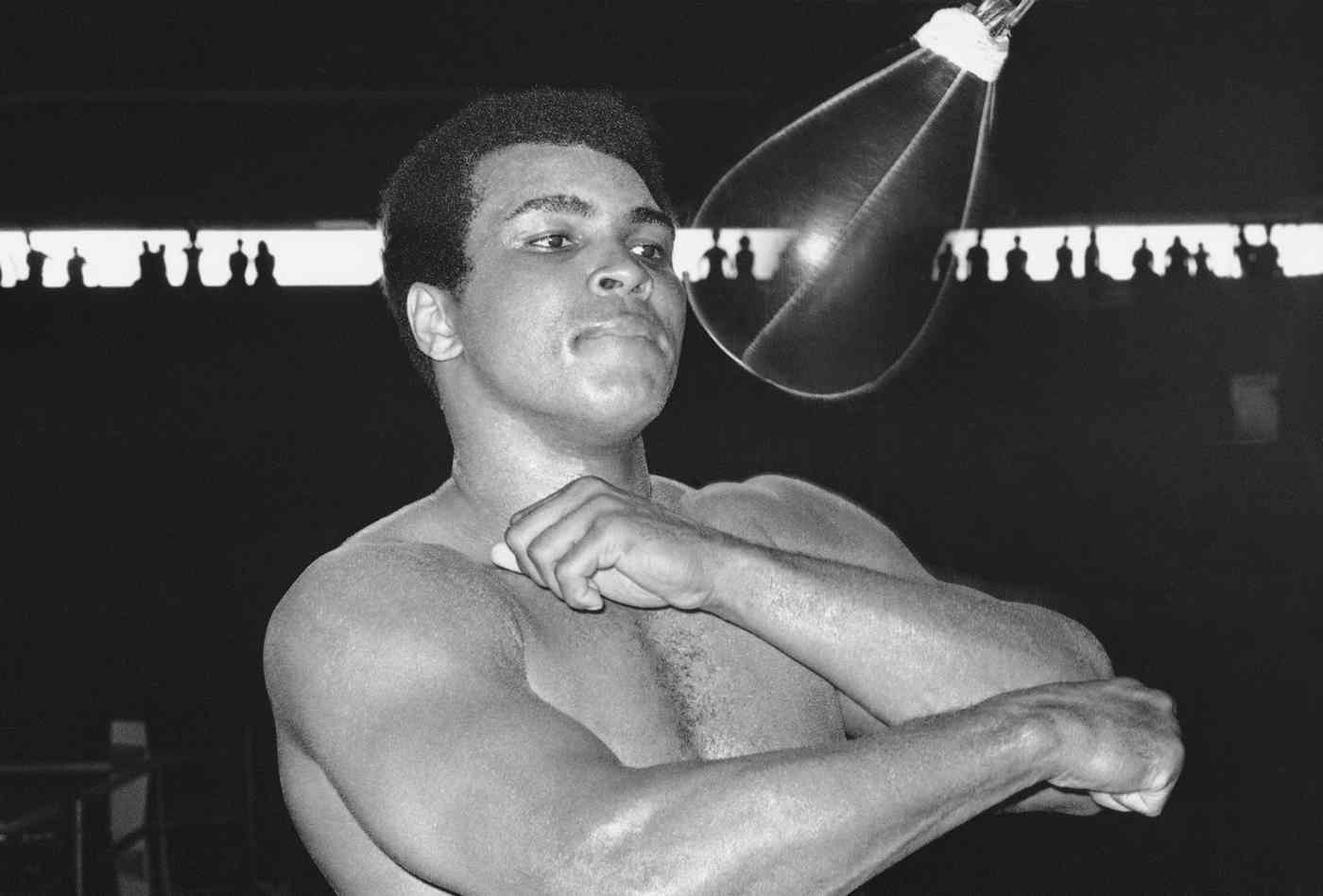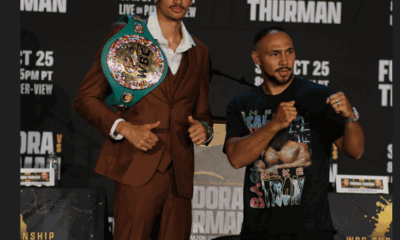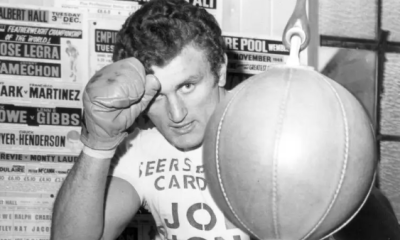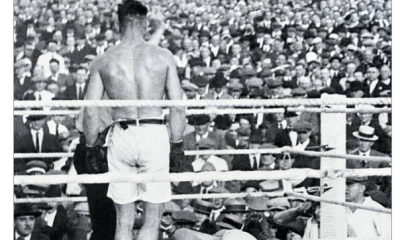Asia & Oceania
Muhammad Ali: A Life – Insights Culled from a New Documentary

ALI — Last year, I was involved in the making of a documentary entitled Muhammad Ali: A Life that will be televised by Epix on January 17 to mark the 75th anniversary of Ali’s birth.
Robert Lipsyte and Randy Roberts are featured prominently in the documentary. Lipsyte covered Ali as a journalist for the New York Times and other publications from the early 1960s on. He was present at the Fifth Street Gym when Cassius Clay met the Beatles; at Convention Hall when Clay dethroned Sonny Liston; and at Ali’s home in Miami when Muhammad uttered the immortal words, “I ain’t got no quarrel with them Vietcong.”
Roberts is a Distinguished Professor of History at Purdue University with books about Jack Johnson, Jack Dempsey, Joe Louis, and Mike Tyson to his credit. Most recently, he co-authored Blood Brothers: The Fatal Friendship Between Muhammad Ali and Malcolm X.
The quotes below are from Lipsyte, Roberts, and others in the boxing community who were interviewed for the documentary. Some of these quotes are in the final version of the film; some aren’t. All of them offer insight into the extraordinary life of Muhammad Ali.
Randy Roberts: “Here is this guy who emerges from the 1960 Olympics with a gold medal in the light-heavyweight division. He wants a tomato-red Cadillac. He wants to be rich. He wants to become heavyweight champion by the time he’s twenty-one or twenty-two years old. This is what he stands for. This is what he wants. I don’t think there was a whole lot more than that. I don’t think he ever saw the direction he was going to go in. He wanted what all great athletes want. Money, riches, fame. But en route to that goal, a life happened.”
Robert Lipsyte: “It’s instructive to go back to the movie with Will Smith – Ali – which gives the impression that he came out of the womb, this man of principle, who was going to remake the world. That’s not true at all. He was, I think, an intelligent but ignorant and totally uneducated, barely literate kid who, from the age of twelve on, really did nothing but box and was in that tunnel. He evolved into this fighting machine who was totally suggestible on so many levels to his boxing trainers, to the Nation of Islam, to the currents of the society around him. He became Muhammad Ali incrementally over a number of years. The idea that anybody is the picture on the dollar bill at birth is insane. We learn this in sports, where Michael Jordan didn’t make his junior high school basketball team. He didn’t start in high school until late. He had to work hard and develop. We understand that. Sometimes it’s harder to understand how people mature and develop socially, politically, and emotionally.”
Randy Roberts: “When he burst on the world stage, it was all about, ‘Ain’t I pretty? Ain’t I the prettiest?’ He never said, ‘Ain’t I handsome?’ But he was able to get away with it. Take a look at those early images of him. Very few athletes, if any, look that good. And there have been none that looked that good and were that good.”
Robert Lipsyte: “Let’s remember that Muhammad Ali came out of an unstable abusive home. His father was violent. His mother was ineffectual. He lived in a segregated city. When he came back from Rome with the Olympic gold medal in 1960, he still could not go to every restaurant he wanted to go to. But here was a group, the Nation of Islam, that said, ‘You’re beautiful. Black is beautiful. We are the real people. White people were carved out of us by an evil scientist.’ Elijah Muhammad became his surrogate father. He had all these brothers and uncles within the Nation of Islam. He had an enormous support system of people who believed in him in ways that gave him real inner strength.”
Randy Roberts [to Lipsyte]: “The reality is that you didn’t meet Ali in the 5th Street gym [in 1964]. He was still Cassius Clay at that time. Then you started to cover Muhammad Ali. In many ways they are two different figures.”
Robert Lipsyte: “I don’t think that there were many reporters sitting at ringside [for the first Liston fight] who thought Cassius had any chance. But something kind of clicked in the back of my mind when the bell rang and they came out. I suddenly realized, Cassius Clay is bigger than Sonny Liston. We’d all been writing David versus Goliath. But David was taller and he was big, and we had to now start re-evaluating a little bit. Then, within the first couple of rounds, it was very clear that Cassius Clay had a script. He was following his script. He was moving faster and he was taking control of the fight. Except for that moment when he was blinded in the fifth round, he was in total control of the fight.”
Teddy Atlas: “He was the first guy that did things wrong in a ring and made it right. It’s pretty special that he could write his own textbook.”
Robert Lipsyte [on the day after Liston-Clay I]: “This kid who’d been so garrulous and loud and brassy was very subdued and very quiet. I remember the press conference the next morning. He said, ‘The fight is over. Now I can just be polite.’ All the older reporters were kind of, ‘Yeah, I knew it was just an act.’ They were all very satisfied because it somehow reaffirmed their conservatism, their idea that we’re not really up against something new or different here. It’s just some flashy guy who tried to pull the wool over our eyes. But now that he’s won the championship, he’s going to be like everybody else and show us respect and be calm. They went off to write their stories and left a group of younger reporters. We were dissatisfied. Somehow, we felt betrayed because we had a different idea of who Cassius Clay was. He was the future. He was a revolution. He was different from every athlete who’d ever lived. People kept pressing him. Young reporters kept pressing him. ‘So, this was all an act? What about the Muslims? Is there any connection between you and the Muslims?’ He kept deflecting and moving. Suddenly, somebody asked, ‘Are you a card-carrying Muslim?’ That was a very evocative cold war line, because of ‘Are you a card-carrying communist?’ Great implications. ‘Are you a card-carrying Muslim?’ He kind of jumped back and said, ‘Red birds stay with red birds, and blue birds with blue birds, and lions with lions, and tigers with tigers, and I’m not going to go any place where I’m not wanted.’ Somebody said, ‘What about integration? What about the civil rights movement?’ That’s when he made his declaration of independence. He said, ‘I don’t have to be what you want me to be. I’m free to be who I want.’ That was the story. He said a lot of other things later that have been chipped onto the wall of history. But that declaration of independence was very powerful and has resonated up to this day.”
Bernard Hopkins: “Muhammad Ali was our face. He gave us a voice to be able to speak boldly and proudly about what we believe we can do. At that time when it was so easy to compromise, so easy to say okay, he stood up.”
Paulie Malignaggi: “He was a person that made lot of people believe in themselves when maybe they had a reason not to believe in themselves. He was a person that showed just how mentally strong you can be. He stood for something and he wasn’t going to give up what he stood for no matter what the price would be.”
Robert Lipsyte: “The use by the media of his name, Muhammad Ali, became a kind of political litmus test. There were some people who just could not say ‘Muhammad Ali.’ They couldn’t give it to him. But by 1965-1966, if you went up to him and said, ‘Hey, Cassius,’ he wouldn’t talk to you. The reporters who couldn’t get ‘Muhammad Ali’ out of their mouth would say, ‘Hey, champ.’ And he would give them that lizard eye because he knew what that was all about. It took a long time before people were able to call him Muhammad Ali. I know, I had a really hard time getting ‘Muhammad Ali’ into the New York Times. In the beginning, they wouldn’t do it. They said, ‘Well, unless he changes his name in a court of law.’ I said, ‘Come on. This is about him choosing his own name. We don’t bother Cary Grant and Rock Hudson or John Wayne with what’s your real name? But the Times wouldn’t do it. After I made enough of a fuss, it was ‘Cassius Clay, who prefers to be called Muhammad Ali.’ And then, after a while, ‘Muhammad Ali, also known as Cassius Clay.’ I remember really being embarrassed, writing these stories in which he would refer to himself as Muhammad Ali and the desk would change it to Cassius Clay, which wasn’t what he said. Once, I apologized to him. I said, it was out of my control. He patted me on the top of my head and said, ‘Don’t worry. I realize you’re just a little brother of the white establishment.’”
Paulie Malignaggi: “Muhammad Ali versus Cleveland Williams, I don’t know of any heavyweight in history who beats that Ali. When I watch that fight it’s the most amazing thing. He’s just blitzing him with speed, timing, angles. You don’t know where it’s coming from and it looks effortless. They took that away from him. They robbed him of what would have been his greatest years in the ring. They robbed us of seeing something so brilliant.”
Roy Jones: “He stood up for right. He’s the best example of that you’ll ever see.”
Robert Lipsyte: “There was something almost innocent about Muhammad Ali. Dick Gregory called him the baby of the universe. Even at his vicious worst, there was an innocence about him and kind of an absorption of the ills of the world in his willingness to embrace everyone. There was something glowing about him. He was one of those people to whom we can attach our needs. We need a hero to be brave. We need a hero to have principle. We need a hero to understand us. He seemed to have all those things.”
Randy Roberts: “He gave everybody around him the same amount of him. He didn’t reserve himself for the rich, the famous, the influential.”
Paulie Malignaggi: “When he came back, you now had to respect how mentally strong and how much of a competitor he was. Before, he made it look easy. Now you got to see how badly this guy wanted to win. And when you show how badly you want to win, no matter what price you have to pay, that shows character. So we started to learn about the character of the man inside the ring, not just the character of the man outside the ring. This man stood for something and he was willing to fight for it no matter what outside the ring. And then he was willing to fight for what he wanted inside the ring. In both situations, he was willing to accept the consequences, no matter what, to achieve what he wanted and needed to achieve. That’s a rare kind of man.”
Teddy Atlas: “It’s a paradox. It’s a struggle. It’s alternating currents as far as what Ali means to me. He means that, if you believe in something, you stick to it no matter what the consequences are. So that’s one thing. But then the paradox of it is that sometimes I look at him and he wasn’t quite as sparkling as I wanted to believe. He was mean-spirited to Frazier. He did a lot of mean things there, and that went in contrast to what brought me to Ali’s side, a guy that loved all people, a guy that believed in remaking the world in the right way. To have the beautiful image that I want to have of him, I have to forget about how he took apart Joe Frazier and how it affected and impacted Joe Frazier with him being so mean towards him.”
Randy Roberts: “The language he used [to demean Joe Frazier] was unforgivable, but somehow it was forgiven. If your politics allied with his, you tended to say, ‘Well, it’s a show.’ You know, one of the most mystifying aspects of Ali is, some of the things that he did and some of the things he said were absolutely repugnant. But the love for him seemed unconditional.”
Roy Jones: “You got to have courage, but you also got to have faith. If you don’t have faith, then you won’t have courage. Ali wasn’t sure he could beat George Foreman. But he had an idea. He challenged him. He felt he would figure out a way or God would give him a way. That’s courage and faith combined, and that’s where Ali was best.”
Bill Caplan [George Foreman’s publicist in Zaire]: “George loves Ali. But at that time, he didn’t like him. Ali had this plan of walking around with the crowds, saying ‘Ali, Bomaye,’ which meant ‘Ali, kill him.’ You can’t really like a guy who was asking the people of Kinshasa to kill you.”
Teddy Atlas: “Ali reminds me that there’s a price for greatness. And it also reminds me that what makes you great, that great drive, that great ego, that great belief that you can do anything, that nothing is going to stop you; that can wound you if it’s not controlled.”
Robert Lipsyte: “I talked to George Foreman in the late-1990s. By this time, he was totally lovable. It was a TV interview and I had everything I needed. So I asked, ‘How do you feel as Muhammed Ali deteriorates further and further, knowing that you did a lot of the damage to him?’ And George said, ‘You know, I think about the old veterans of American wars who protected us. They take off their hands or their legs or their eyes that they lost in this war, and all you can do is thank them for what they did for us. And that’s the way I think about Ali.’ Now George didn’t actually answer the question. But I thought that was a beautiful way to think about Ali and to think about his damage now as part of his sacrifice for us.”
Randy Roberts: “His whole life is a product of choices. Good choices, bad choices, I don’t think he made a whole lot of conscious choices where he went home and agonized, ‘What am I going to do?’ I don’t think there was that cerebral quality of trying to think through choices. I think he made most of his choices ad hoc, and he usually made the right choice. If you go back and look at the big choices – maybe not some of the personal ones – he tended to make the right choice. His position on Vietnam turned out to be the right position on Vietnam. His declaration of independence turned out to be the right declaration. The really big choices that he made, he tended to be on the right side of history.”
Robert Lipstye: “You think of Ali with all the hopes, dreams, aspirations, sentiments that we put on him. He became for us the model, the symbol, the trailblazer of courage, the great hero athlete, the man who sacrifices, gives up for principle. Whatever it is you want him to be in your mind, he can be that. He’s such a great love absorber that he can represent all of us in so many different ways. But I think it’s what the watcher saw rather than the watched. Do you think that there’s less there than we want to believe was there?”
Randy Roberts: “We can criticize Ali in a thousand different ways. But he cared about people. He truly cared about people.”
Robert Lipstye: “His legacy was sanitized, partially by time and partially, I think, by his current wife, Lonnie, who is the curator of his legend and business activities. It’s not to anybody’s advantage who has a financial stake in him now to remember that, once upon a time, he was threatening and a great deal of America, black and white, was frightened of him.”
Gareth Davies: “Muhammad Ali spoke like a poet. He fought like a warrior. He made black beautiful. He made boxing beautiful. He oozed charisma and was probably the most beautiful man on the planet. He always had time for people. He was a people person, and people loved him. He never ever stopped being a man of the people. He’ll be remembered as the greatest character we’ve had in boxing and, probably, the greatest character in sport.”
Thomas Hauser can be reached by email at thauser@rcn.com. His most recent book – A Hard World: An Inside Look at Another Year in Boxing – was published by the University of Arkansas Press. In 2004, the Boxing Writers Association of America honored Hauser with the Nat Fleischer Award for career excellence in boxing journalism.
Check out more boxing news on video at The Boxing Channel.
-

 Book Review4 weeks ago
Book Review4 weeks agoMark Kriegel’s New Book About Mike Tyson is a Must-Read
-

 Featured Articles3 weeks ago
Featured Articles3 weeks agoThe Hauser Report: Debunking Two Myths and Other Notes
-

 Featured Articles3 weeks ago
Featured Articles3 weeks agoMoses Itauma Continues his Rapid Rise; Steamrolls Dillian Whyte in Riyadh
-

 Featured Articles3 weeks ago
Featured Articles3 weeks agoNikita Tszyu and Australia’s Short-Lived Boxing Renaissance
-

 Featured Articles4 weeks ago
Featured Articles4 weeks agoKotari and Urakawa – Two Fatalities on the Same Card in Japan: Boxing’s Darkest Day
-

 Featured Articles3 weeks ago
Featured Articles3 weeks agoIs Moses Itauma the Next Mike Tyson?
-

 Featured Articles2 weeks ago
Featured Articles2 weeks agoBoxing Odds and Ends: Paul vs ‘Tank,’ Big Trouble for Marselles Brown and More
-

 Featured Articles3 weeks ago
Featured Articles3 weeks agoAvila Perspective, Chap. 340: MVP in Orlando This Weekend




















